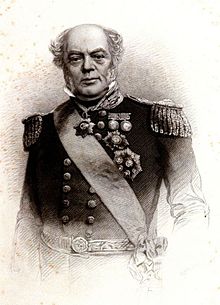James Whitley Deans Dundas
Sir James Dundas | |
|---|---|
 Admiral Sir James Whitley Deans Dundas | |
| Born | 4 December 1785 |
| Died | 3 October 1862 (aged 76) Weymouth, Dorset |
| Allegiance | |
| Service/ | |
| Years of service | 1799–1857 |
| Rank | Admiral |
| Commands held | HMS Tagus HMS Prince Regent HMS Britannia Mediterranean Fleet Baltic Fleet |
| Battles/wars | Napoleonic Wars Crimean War |
| Awards | Knight Grand Cross of the Order of the Bath |
Early career

Born the son of Dr James Deans (of
Dundas was given command of the third-rate HMS Stately, flagship of Rear Admiral Thomas Bertie, in the Baltic Fleet in March 1809.[1] He took command of the third-rate HMS Venerable in January 1812 and then the frigate HMS Pyramus in September 1812 and in the latter ship captured two more privateers.[1] He took command of the armed frigate HMS Tagus in the Mediterranean Fleet in August 1815 and then the first-rate HMS Prince Regent, as flag captain to Admiral Sir William Parker who was commanding on the coast of Portugal, in 1830.[2]
Entering politics, Dundas became
Having been elected Member of Parliament for Greenwich again at the 1841 general election,[6] Dundas became Fourth Naval Lord in the Second Melbourne ministry in June 1841 but stood down in September 1841 when the Government fell from power.[7]
Senior command

Promoted to
Dundas was appointed
Dundas returned to England in January 1855 and was appointed to the Turkish Order of the Medjidie (First Class) on 15 May 1855,[12] advanced to Knight Grand Cross of the Order of the Bath on 5 July 1855[13] and awarded the Grand Cross of the French Legion of Honour on 30 April 1857.[14] Promoted to full admiral on 8 December 1857,[15] he died at Weymouth in Dorset on 3 October 1862.[2]
Family
On 2 April 1808, he married his first cousin, Janet, only daughter and heiress of Charles Dundas, later Lord Amesbury.[1] His first wife died in April 1846 and, in August 1847, he married Lady Emily Moreton, fourth daughter of Thomas Reynolds-Moreton, 1st Earl of Ducie.[1] By his first wife, he had a life interest in large estates in Flintshire and Berkshire – centred on Aston Hall in Flintshire and Barton Court at Kintbury in Berkshire – which, at his death, passed to his grandson, Mr. Charles Amesbury Deans Dundas. (Dundas' elder son, Charles Whitley Deans Dundas, having predeceased him in 1856.)[1]
See also
References
- ^ a b c d e f g h i j k Admiral Sir J. W. Deans Dundas GCB. The Gentleman's magazine, Volume 213. 1862. p. 782.
- ^ required.)
- ^ "No. 19167". The London Gazette. 24 June 1834. p. 1189.
- ^ "No. 19355". The London Gazette. 12 February 1836. p. 286.
- ^ "No. 19600". The London Gazette. 23 March 1838. p. 727.
- ^ "No. 19998". The London Gazette. 13 July 1841. p. 1812.
- ^ a b c Sainty, J C (1975). "'Lord High Admiral and Commissioners of the Admiralty 1660–1870', Office-Holders in Modern Britain: Volume 4: Admiralty Officials 1660–1870". pp. 18–31. Retrieved 3 January 2013.
- ^ "No. 20044". The London Gazette. 24 November 1841. p. 3015.
- ^ Department of Information Services (14 January 2010). "Appointments to the Chiltern Hundreds and Manor of Northstead Stewardships since 1850" (PDF). House of Commons Library. Archived from the original (PDF) on 6 February 2011. Retrieved 3 January 2013.
- ^ "No. 21290". The London Gazette. 13 February 1852. p. 407.
- ^ "No. 21394". The London Gazette. 24 December 1852. p. 3736.
- ^ "No. 21714". The London Gazette. 18 May 1855. p. 1915.
- ^ "No. 21743". The London Gazette. 10 July 1855. p. 2654.
- ^ "No. 21996". The London Gazette. 1 May 1857. p. 1573.
- ^ "No. 22071". The London Gazette. 11 December 1857. p. 4367.
Further reading
- Russian war, 1854, Baltic and Black Sea: official correspondence, edited by David Bonner-Smith and Captain A.C. Dewar. Publications of the Navy Records Society. v. 83. ([London]: Printed for the Navy Records Society, 1943)
- Note in the Bodleian Library Catalog: "Correspondence between the Admiralty and Vice-Admiral Sir Charles Napier respecting naval operations in the Baltic.--Correspondence between the Admiralty and Vice-Admiral Sir James Deans Dundas respecting naval operations in the Black Sea."
External links
- O'Byrne, William Richard (1849). . . John Murray – via Wikisource.
- Hansard 1803–2005: contributions in Parliament by James Dundas
- "Archival material relating to James Whitley Deans Dundas". UK National Archives.

